GMP: Food Manufacturing for Professionals (21 CFR Part 117)
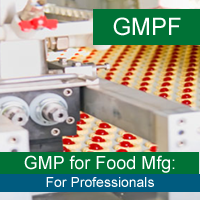 |
Price: $ |
Document your dedication to compliance, safety, and job performance by earning a professional certification.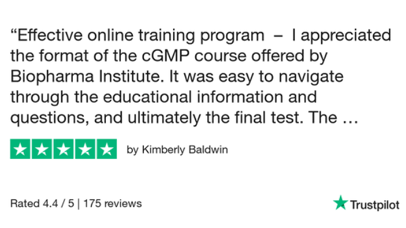 Training Provided By: Biopharma Institute Training Provided By: Biopharma InstituteWebsite: https://www.biopharmainstitute.com Outline/Syllabus: See individual course pages for outline. Description: cGMP stands for current Good Manufacturing Practices. In the USA, for food manufacturing, these are prescribed by the Code of Federal regulations, 21 CFR Part 117. Prior to this the GMPs were published in 21 CFR Part 110, which was replaced making way for Part 117. This GMP: Food Manufacturing for Professionals (21 CFR Part 117) program includes three (3) individual courses. The first course, GMP Awareness: Food Manufacturing, focuses on providing an understanding and appreciation of cGMP (current Good Manufacturing Practices) and its significance in the food industry. However, before getting into GMP, the Food Safety Modernization Act (FSMA) is described, which was signed into law in 2011. FSMA is the most significant change in food safety law since the passing of the Food, Drug, and Cosmetic Act in 1938. The course moves on to provide a brief history of cGMP for the US food industry. Here we explore the origins and development of cGMP in the context of the food industry. The six (6) key reasons why following cGMP guidelines is crucial in ensuring food quality and safety are introduced. Then, we move onto introducing the nine (9) principles which assist in implementing cGMP in any food manufacturing company. An assessment is provided to understand learning outcomes and is designed to evaluate the learners' understanding and knowledge acquired during the training. The second course, GMP: Food Manufacturing Warning Letters and Case Studies, describes what happens when the FDA discovers significant violations of its regulations by a manufacturer and initiates communication with the manufacturer through a Warning Letter. This letter points out the specific violation. The FDA emphasizes that the company must rectify the problem and provides instructions for responding with its corrective plans. The FDA then verifies the adequacy of the company's corrections. In this course, GMP: Food Manufacturing Warning Letters and Case Studies, several case studies which resulted in the issuance of Warning Letters are discussed. Overall, the FDA's audits serve as an opportunity for food facilities to identify areas of improvement and enhance their commitment to food safety and quality. Addressing GMP violations promptly and implementing robust corrective actions are critical for maintaining compliance and protecting public health. This course uses case studies to describe why Warning Letters may be issued and how they must be handled, especially with respect to addressing the concerns or issues with appropriate corrective actions. The third course in this program, GMP for Food Manufacturing: The Nine (9) Principles (21 CFR Part 117), describes the nine (9) principles which help implement cGMP in any Food Industry, as per the guidelines prescribed in 21 CFR Part 117 Subpart B - current Good Manufacturing Practice. In this course, GMP for Food Manufacturing: The Nine (9) Principles (21 CFR Part 117), these 9 principles are described:
Once the 9 principles have been introduced and described, the program moves on to describe the implementation of cGMP requirements in the facilities. This section notes that food manufacturers must develop a written plan that includes hazard analysis and risk-based preventive controls. They must also establish monitoring procedures, corrective actions, verification procedures, and record-keeping systems. Once this program is complete, students will understand that cGMP is a set of principles and procedures that must be followed to ensure that the products manufactured in the Food Industry are manufactured to the required quality and safety standards. Students will be exposed to the evolution of GMP for the Food Industry and learn its importance through case studies describing times when Warning Letters have been issued to companies for non-compliance. Students will understand the importance of FDA inspections in ensuring that the industry complies with cGMP regulations. Students will be exposed to the 9 main principles for cGMP implementation as per 21 CFR Part 117 in the Food Industry. Students will go through details of the guidance on: Personnel, Plant and grounds, Sanitary operations, Sanitary facilities and controls, Equipment and utensils, Processes and controls, Warehousing, and distribution, Holding and distribution of human food by-products for use as animal food, and Defect action levels.
|
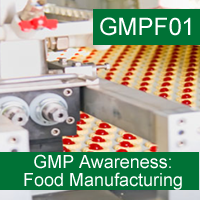 | GMP Awareness: Food ManufacturingCourse ID: GMPF01Duration: 20 minutes Price: Included |
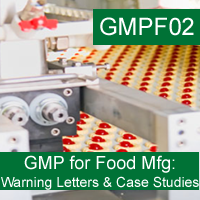 | GMP: Food Manufacturing Warning Letters and Case StudiesCourse ID: GMPF02Duration: 20 minutes Price: Included |
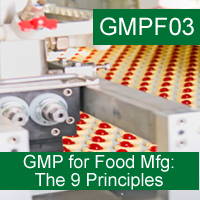 | GMP for Food Manufacturing: The Nine (9) Principles of 21 CFR Part 117Course ID: GMPF03Duration: 35 minutes Price: Included |
Additional Information:
Certification Requirements: Students must view the entire program and successfully pass an online, multiple-choice final assessment for each course within a 12-month period. Certificate of completion is accessible in PDF format immediately after satisfying the requirements.
Biopharma Institute's online training courses include immediate access after enrollment. Username, password, and instructions are emailed to the student directly following online enrollment into the program. Course takers may attempt the final assessment any number of times, as needed, to achieve a passing score.
Once all training requirements have been satisfied a professional certification has been achieved and can be verified immediately from our website using a unique ID code located on the certificate. The professional certificate of completion is also instantaneously launched and made available to the student in a PDF format. Certificates are issued in an encrypted PDF format, and include a watermark, unique validation code, and QR verification barcode. Furthermore, a digital badge is also issued. The digital badge documents all the courses taken and completed within the program, to further validate the student's achievement. Digital badges can be displayed on social networking sites, such as LinkedIn, Facebook, Badgr, and others, to display accomplishments.
Biopharma Institute certificates and digital badges include the date of completion, but do not have an expiration date. However, compliance training is typically considered valid for a period of 3 years. Many organizations suggest that compliance training should be refreshed at least every three years to stay up to date with regulations, standards, guidelines, and to reinforce the importance of maintaining compliance. The validity or recertification period for employee compliance training would be determined by those responsible for managing quality within the company.
Benefits of Being Certified from Biopharma Institute: Throughout our training students will be engaging in active learning using interactive eLearning modules validated by 3rd party organizations for relevancy, compliance, and regulatory content. Courses are developed by subject matter experts (SMEs) and instructional design professionals with the goal to promote the students' retaining of key knowledge. The programs further offer access to regulatory references, real-life case studies, and introduce other important information necessary to assist with learning. Since 2003, Biopharma Institute has been aiding both professionals and their corporate employers with fulfilling training requirements. Biopharma Institute's certifications are recognized by a wide spectrum of industries, regulators, and companies around the world. Furthermore, our training solutions are customizable to any organization's training needs. Today, Biopharma Institute offers over 300 courses training on clinical research, drug manufacturing (cGMP), regulatory affairs, validation systems, pharmacovigilance, good laboratory practice (GLP), and data integrity. We supply our training to clinical research, pharmaceutical, and medical device industries.
Employee / Corporate Training: For corporations seeking a method to train employees, economically, without having to set aside time for travel, webinars, or live, in-person training; Biopharma Institute is the training partner you can rely on. Our training provides an effective, engaging, self-paced learning experience which fits conveniently into the day-to-day activities of most types of learners. Our eLearning modules are SCORM-compliant and can be delivered from most corporate learning management systems (LMS). We catering to both small-scale and large-scale training requests, with the same goal in mind: To make this a good experience for everyone involved, from the students to those managing the group training.
Use our Search Form to Find What You're Looking For:
Benefits of Training with Biopharma Institute
| Immediate access to courses: | Username, password, instructions, and receipt of payment are immediately emailed upon online enrollment. |
| Self-paced, asynchronous eLearning: | 24/7 access to all course materials and assessments for 12 months. |
| Open enrollment: | No prior course prerequisites or work experience required. |
| Expertise: | Courses developed by subject matter experts (SMEs) in the area being taught. |
| Current and validated: | Training is current with respect to regulations, procedures, and 3rd party validated and/or accredited. |
| Optimized for learning: | Courses include voiceovers, easy navigation, reading materials, case studies, progress checks, and high-quality animations to increase retention of subject matter. |
| Secure and safe access: | Encrypted website and LMS connections, firewall, and daily malware scans deliver optimal security and performance. |
| Flexible final assessments: | Multiple-choice questions can be taken repeatedly until a passing score is achieved. |
| Direct access to certificates: | Upon completion, certificates are immediately issued in an encrypted PDF format. Certificates include a watermark, unique validation code, and QR verification barcode. |
| Verification of training: | Certificates are verifiable online using QR barcode or the unique ID code. Digital badges are additionally issued for all professional certification programs. |
| Training manager access: | A proprietary portal offers access to download enrollment reports, training records, account balance, and more. |
| SCORM-compliant courses: | Courses can be delivered directly to most corporate Learning Management Systems (LMS). |
| Purchase orders (POs): | POs are accepted from all companies. Request an invoice when starting the procurement process. |
| Reimbursement: | Some employers may reimburse their employees for training expenses. Check your company's policy. |
| Financial assistance: | Payment plans are available to those who qualify. Alternatively, purchasing individual courses one at a time is also an option. |
| Career advancement: | Professional certifications help demonstrate interest and dedication to career and job performance. They may be helpful for those seeking to grow their career or transitioning to a different position within an organization. Professional certifications are a great addition to a resume, offer talking points for the interview, and practical knowledge for performing duties. |
Have Questions? Contact Us:
Use the form below if you would like more information on our programs. You may want to request a quote on group training or an invoice for generating a company purchase order. For quotes or invoices please provide the course(s) and number of students. Alternatively, call toll-free from the US or Canada: +1 (888) 424-6576. International callers may dial: +1 (201) 301-8370.

 Download
Download 




